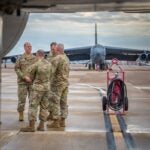The Air Force is currently planning for “longer-term” budget uncertainty, including potential sequestration in March, two of the service’s leaders wrote Monday. Air Force Vice Chief of Staff Gen. Larry Spencer and Acting Under Secretary Jamie Morin did not provide specifics on how the service was preparing for long-term uncertainty in their memo to major command leaders, but the two did spell out numerous short-term actions major command leaders should take to reduce the Air Force’s spending, especially in operations…
Recommended
Trending
Congress Updates
Wicker Wants Legislation On DoD’s Equity Investments In Minerals Supply Chain
Legislation regarding equity investments by the Defense Department in critical mineral supply chains is needed to strengthen the larger defense industrial base and demonstrate to the “free market” that the […]
“Not Sure How They Get To Where They Wanna Be,” Calvert Says of $1.5 Trillion Defense Topline Proposal
As the federal government enters a third week of tardiness in a fiscal 2027 budget release, a big question is how the Pentagon will be able to spend $500 billion […]
Path Uncertain For $1.5 Trillion FY ‘27 Defense Topline After Trump Casts Doubt On Second Reconciliation Bill
The path to achieve the White House’s call for a $1.5 trillion defense topline in 2027 appears murkier now after President Donald Trump has cast doubt on the prospects of […]
Senate Budget Dems Push For Defense Reconciliation Spending Details, Cite ‘Slush Fund’ Concerns
Democrats on the Senate Budget Committee have raised “significant concern” with the Pentagon’s move to classify reconciliation spending plans, urging the department to provide more public details on how the […]
Job Feed
-
Early Career R&D Mechanical Engineer
Gas Transfer Systems, Onsite - Sandia National Laboratories - Livermore, CA -
Senior/Principal Data Science
Complex Systems, Onsite - Sandia National Laboratories - Albuquerque, NM -
Early Career Cybersecurity
Artificial Intelligence (AI) Researcher, Onsite - Sandia National Laboratories - Albuquerque, NM -
Sr. Sustainability Analyst
Sunbelt Rentals - Fort Mill, SC












